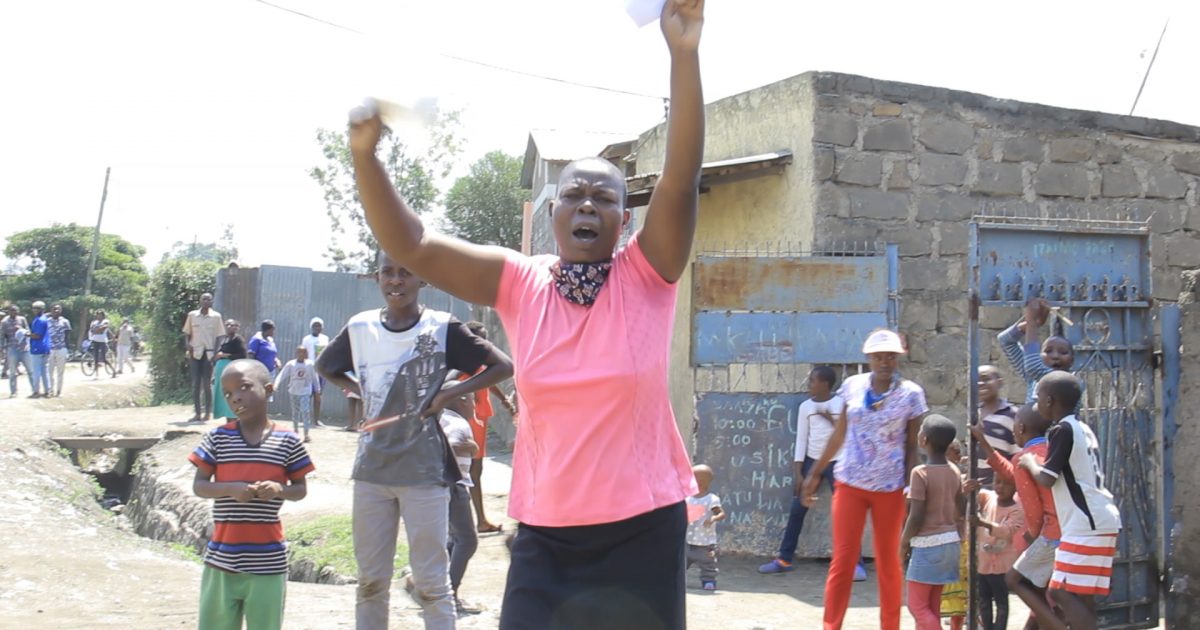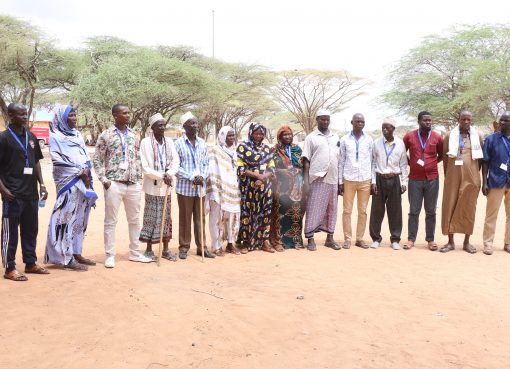Life has not been kind to 61-year-old, Millicent Akinyi Malaki. She is penniless and has not eaten for days. Worse still, she is staring at the possibility of being kicked out of her matrimonial home.
Ms. Malaki’s is a story of double tragedy. In 2010 when her husband threw the mother of four out of their upcountry home in Western Kenya and relocated her to Nakuru she hoped the situation would just linger for some few days before they reconciled.
Ten years later, Ms. Malaki

who is visibly worn out, sick and struggling to support herself financially, is at her wits end after receiving a notice demanding that she vacates her house within Kaptembwa Estate in Nakuru West Sub-County from a man who purports to have bought the property from her husband.
“I don’t have my name on any of the property we acquired though I also chipped in financially to pay for it. According to his custom (Luo) women cannot own anything in their name.
My husband who is now living with another woman never allowed me to have my name on the title. He would say ‘I’m the man of the house, what I have you have. If I own it, you own it.’ Who will support me to get my share? I’m on my own,” she pleads.
Seeking mercy, confused, jobless and with nowhere to turn to, Ms. Malaki says they got married sometime in 1991 but separated in 2010.
“When you work on a marriage for more than 15 years and lose it all in the blink of an eye, it is devastating. What is more painful is when the man you know as the father of your children moves to dispossess you of the only shelter over your head.
I do not have money; I’m not as rich as my husband is. Where do I start and how do I start?” she cries.
She dreads the prospect of being left homeless after the purported buyer visited the premises armed with an eviction order from the court in company of what she describes as mean looking men.
Ms. Malaki further accuses her estranged husband of denying her access to their eldest daughter and shirking his parental responsibilities by not taking care of their three children with whom she is putting up.
Her 19-year-old daughter, Mercy Malaki wrote her Kenya Certificate of Secondary Education (KCSE) examinations in 2016 and attained a mean grade of C. She aspires to be a nurse or an International Relations expert.
However hope is fast ebbing for Mercy after what she claims to be her father’s flat refusal to pay her fees, leaving her with no option but to resort to menial jobs to eke out a living.
“Many are the nights we go to bed hungry. My future and that of my siblings is bleak after our father abdicated his parental duties. To cap his mistreatment, he has roped a stranger in his schemes who now claims to be the owner of the only home we know,” laments the teenage girl.
A neighbour Daisy Moraa says following the outbreak of Covid-19 pandemic Malaki’s situation had worsened as she could no longer get the menial jobs that she used to rely on to fend for her family.
Ms. Moraa states that her neighbour has also been unsuccessfully struggling to get relief food and vouchers distributed by the County government.
“She used to wash clothes in her neighbourhood for a living, but people have now become cautious and no longer allow anyone into their houses. She has nowhere to run to and her children keep on crying because of hunger.
I have children like her. I felt sorry for her and I decided to come and share the little I have,” offers Moraa.
Miriam Bulemi, a coordinator from Young African Women Initiative (YAWI) said the organisation would assist Ms. Malaki get legal advice and protection against the planned eviction.
She says instances where spouses are being thrown out of their matrimonial homes by their partners directly or indirectly through physical and psychological violence were rising at an alarming rate in the country.
She states that Article 53(1)(e) of the Constitution clearly provides that, “Every child has the right to parental care and protection, which includes equal responsibility of the mother and father to provide for the child, whether they are married to each other or not”.
Ms. Bulemi says Ms Malaki can demonstrate before a court of law that she also made non financial contributions in acquisition of the properties.
She further states that Article 45(3) of the Constitution is clear that spouses have equal rights at the time of marriage, during and upon dissolution of marriage.
“The law defines non-financial contributions to “include domestic work and management of matrimonial home; child care; companionship; management of family business or property; and farm work. Ensuring justice and rights for the woman doesn’t have to be so difficult,” says the YAWI Coordinator.
Daisy Mochache, a lawyer who does social outreach programmes under the auspices of Wakili Mashinani says Malaki can file for orders to access her eldest daughter after exhausting all the requirements spelt out by the Children’s Department.
Ms. Mochache says no spouse can evict his or her partner at will from a matrimonial property should the marriage hit the rocks, thanks to the Matrimonial Property Act 2013.
“In line with Article 45(3) of the Constitution, the law upholds equality in marriage, which safeguards each spouse’s interests in that union.
In daily practice, some women are kicked out of family property, with apartments and plots once given to them as gifts ‘demanded’ back after marital disputes.
It has not been strange to see some physically abused wives leaving matrimonial homes carrying their belongings in paper bags. This is now history,” explains the legal counsel.
Section 12(3) of the law states that a spouse shall not — during the subsistence of the marriage — be evicted from the matrimonial home by or at the instance of the other spouse, except by a court order.
According to the law, a spouse can only be evicted following a court order to sell the house, trustee in bankruptcy, mortgagee or charge exercising a legal power of sale.
The law further prohibits transactions (sale, mortgage or lease) of the matrimonial home(s) without the written and informed consent of both spouses.
By Anne Mwale /Dennis Rasto




